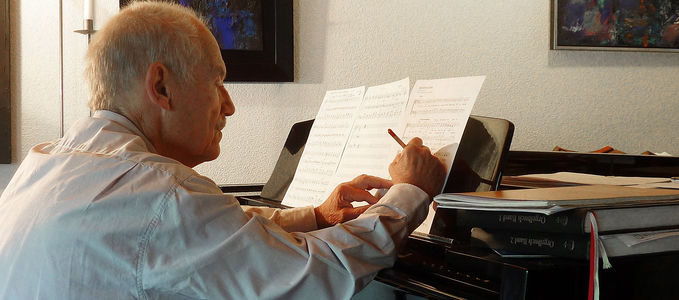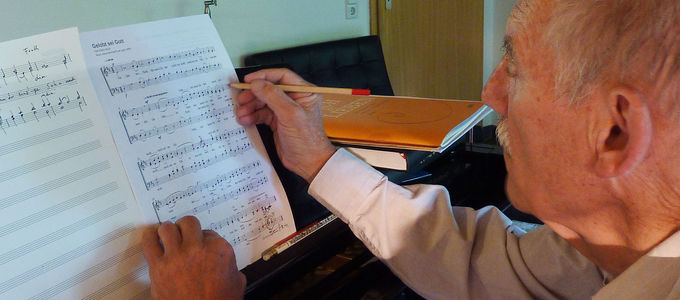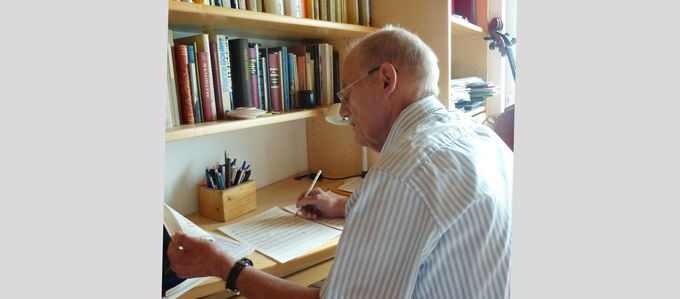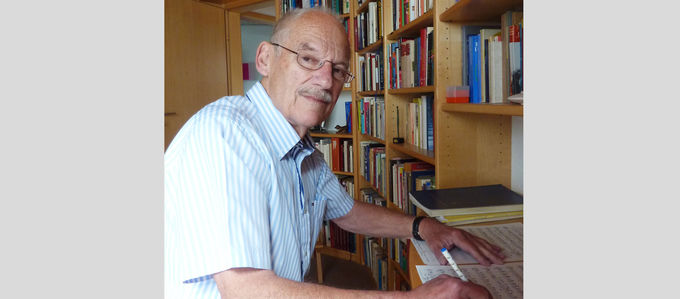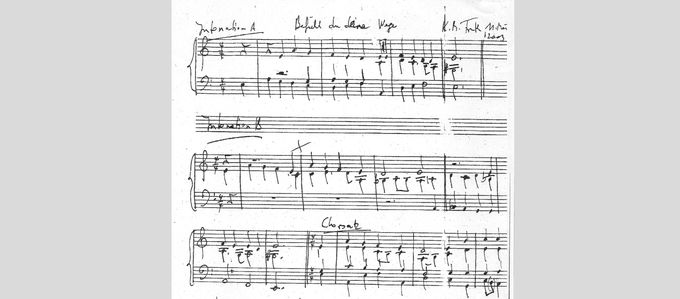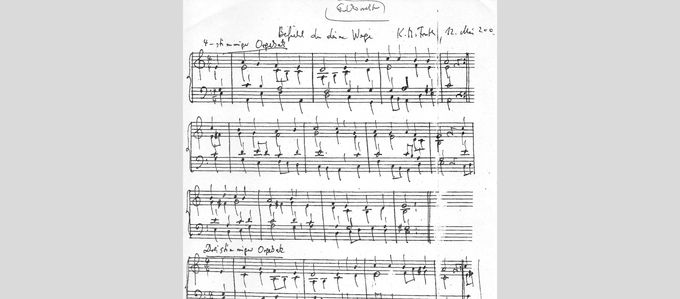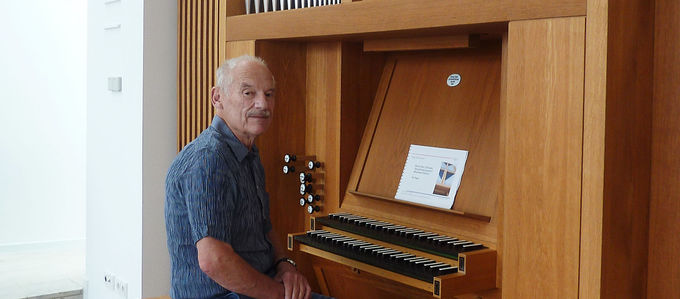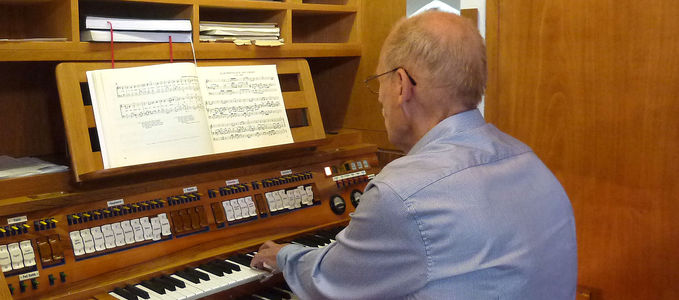Klaus Michael Fruth: staunch supporter of a shift in music
For 55 years Klaus Michael Fruth has been composing music for the New Apostolic Church. To date he has created 297 compositions. That makes 5.4 compositions a year. Tomorrow, Klaus Michael Fruth, who is a German-language and math teacher, celebrates his 75th birthday.
Some of his compositions of “Forever with the Lord” and “Commit thy way, confiding” are well known in New Apostolic circles around the world. Compositions by Klaus Michael Fruth have been finding their way into English and German hymnals and choir books for many years. His compositions also appear in the newest songbooks.
First attempts
In 1952 he made his first attempts at composing six piano variations on a German folk song (“Ein Jäger aus Kurpfalz”). Several years later, in 1960, Bischoff Publishers contacted him. Brother Fruth remembers, “Hermann Ober sent several texts to composers, asking them to set them to music. I was one of them. It was a kind of competition. Soon after, at a meeting at the publishers, I met all the other New Apostolic composers: the Brothers Deis, Füssgen, Metzger, Steinberg, and Rödiger.”
He also remembers the shift that was beginning to set in, in the kind of music that was being performed in the Church. There were times when the orchestras and ensembles in our Church did not play variations and artful compositions. “Today there are many possibilities. During my childhood this was rather limited. I grew up with congregational and choral singing. The choir sang the songs that the choir leader had collected, the organist played the songs from the hymnal and sometimes accompanied the choir. There were hardly any professionally trained musicians in our ranks. And there was the widespread opinion that music had to be simple, emotional, and soul-touching, and that as long as it was done by heart everything was just fine.”
Anything artistic had no place in the Church yet, in fact it was often even frowned upon. Brother Fruth, “The mind and the intellect, anything sophisticated and challenging, or remotely artistic was considered worldly. Stylistically individual music with the slightest traces of art in it was not desired. Such classifications often occurred out of ignorance, misunderstandings, or convenience,” the composer says in retrospect.
A slow but sure development
“In 1960 the music representative in Germany, District Apostle Walter Schmidt—who later became Chief Apostle—wanted to cautiously develop new choral music for our church services. Additional composers were consulted. I was one of them.”
It was a challenge. The members had become used to the music they had been hearing and performing, and were not always open for something new. “Developing new choral music was very tough. The choir leaders wanted to continue doing things as they had always done them, and everybody in his own way.” In the 1970s a two-volume choir book was introduced in Germany in loose-leaf binders. New music was added as it became available. In 1980 Bischoff Publishers released two volumes of organ preludes. Brother Friedhelm Deis then followed with his Organ Tutor, Volumes 1 and 2. Many organists have drawn their knowledge from these two tutors.
Training, increasing quality, concerts
A new era began to dawn. “With the increasing musical education of our children and young people, Bischoff Publishers began to expand its offers in the area of music. A new German-language songbook for the youth was published and a book for instrumental accompaniment. The first recordings were done and recording choirs made their first public appearances. Ensembles and orchestras were established at all levels. Chamber choirs and project choirs came into being. There were more and more concerts, even organ concerts, and much later benefit concerts, whose proceeds went towards social causes.”
Development in many areas
Brother Fruth suspects that one thing in particular contributed to this development. “The Church wanted to improve its relations to other Christian denominations. We wanted to be seen by the general public.” Music in the Church began to take on more significance and relevance. The Church was on the road to ecumenism. We wanted to shed our self-imposed isolation. These liberating moves were also felt in our music.
A personal milestone for Klaus Michael Fruth was a concert in one of Germany’s well-known concert halls, the Stuttgarter Liederhalle on 23 December 1988. “I played organ solos on the big concert organ. The inspiration for this concert came from Apostle Werner Kühnle. Many had to get used to the idea of being able to go to a concert organized by the Church.”
A new music culture
Klaus Michael Fruth wanted to expand the Church’s musical horizons right from the start. But how? “I introduced stylistic innovations that people were not familiar with at the time. I used a certain compositional technique and mimicked historic compositions. For example I introduced minor keys, imitations, and relocated the cantus firmus (the given voice, which usually lies with the soprano) into other voices. In my orchestral and organ compositions I followed figures from history such as J. N. David, H. Bornefeld or H. Schroeder, and preferred a free diatonic harmony without the sharpness.” He was not alone on this way to quality and innovation. “We should not forget the dedicated singers, choir leaders, and ministers who were open for innovations to which many first had to get used to,” Brother Fruth says with a great deal of respect and appreciation. Since then there has been a continual development.
Klaus Michael Fruth began to work with Bischoff Publishers at the age of 20. The words of District Apostle Georg Schall came true. He had advised the young man to study music, “This can only be beneficial for the Church.” Tomorrow, Klaus Michael Fruth will celebrate his 75th birthday in his home congregation. The Bishop will be there to conduct the divine service. “Some organist friends of mine will come to visit and play for me,” Brother Fruth says. He will celebrate his birthday with his wife, Heidemarie, and with his family and friends.


